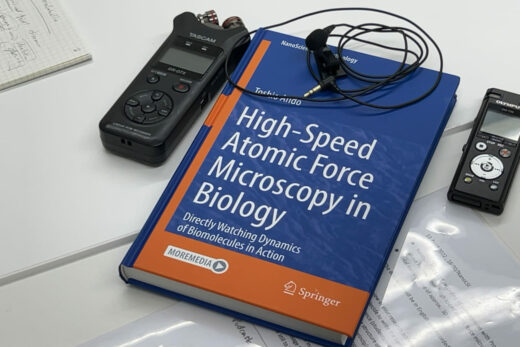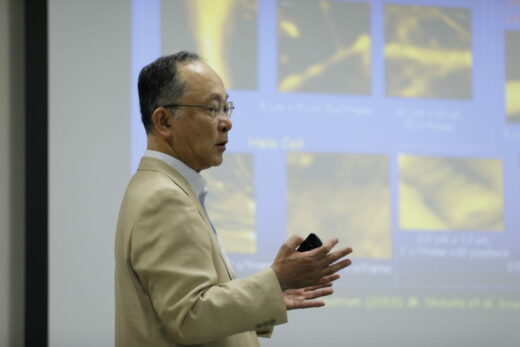Publication of an insightful reference book on high-speed atomic force microscopy (HS-AFM) for in situ biological applications
Pioneering biophysicist Professor Toshio Ando of the NanoLSI publishes his new book on high-speed atomic force microscopy (HS-AFM) for directly monitoring the dynamics of biomolecules. The book offers easy to understand descriptions of the basic technology and in situ biological applications of liquid HS-AFM. The book is ideal for students from multidisciplinary backgrounds interested in accelerating their research on high speed, in situ monitoring of biomolecules.
Professor Toshio Ando is internationally recognized as the pioneer of high speed atomic force microscopy for biological applications. “I first became aware of atomic force microscopy in the mid-eighties after I returned to Japan following several years in the USA,” says Ando. “I had just moved to Kanazawa University and was looking for new paths to explore. I was interested in directly observing the dynamics of proteins. This is when I decided to pursue research on the development of high speed liquid AFM (HS-AFM). Now, more than 30 years later, I want to share my experiences and insights into the technology and applications of HS-AFM. This book is my way of sharing my knowledge about this subject. It is the first book on this topic and hopefully it will inspire the development of the next generation of scanning probe microscopes for biology.”
 Professor Ando describes how he started his research on HS-AFM.
Professor Ando describes how he started his research on HS-AFM.
 Professor Ando describes why he decided to write this book.
Professor Ando describes why he decided to write this book.
The future of high speed AFM
 Professor Ando shares his views about the future of HS-AFM.
Professor Ando shares his views about the future of HS-AFM.
Ando envisages continuous evolution in both the performance and applications of HS-AFM. “The scanning speed is an area of research being addressed by many groups globally,” says Ando. “In my group we are developing new methods, that is system operation procedures, and have achieved 40 frames per second (fps). Conventional systems enable around 10 fps. I expect advances in devices used for imaging will enable image rates of 100 fps within 3 to 4 years. So this area of research is still evolving.”
Ando also foresees that many proteins that have been “untouched” to-date will be imaged by high performance HS-AFM systems. “I expect many more users of HS-AFM in the future,” says Ando.
About the book
 Professor Ando describes the contents of the book.
Professor Ando describes the contents of the book.
‘High Speed Atomic Force Microscopy in Biology” is published by Springer and is available as an eBook or hardcover [1]. The book consists of 18 chapters and more than 300 pages that include practical hints about the preparation of cantilever tips and substrate surfaces, for example, to enable first time users to successfully obtain direct images of the dynamics of proteins and other biomolecules.
The contents are divided into two parts.
Part I
consists of eight chapters that describe the basic principles underlying the operation of the HS-AFM and techniques used for imaging biomolecules. Specific chapters include “Feedback Control and Imaging Rate” and “HS-AFM System and Optimized Instrumental Components” where Professor Ando describes techniques for maximizing imaging rates; the fundamentals of the mechanical properties of short cantilevers; and control electronics to “avoid parachuting”.
Part II
consists of 10 chapters that focus on the biological applications of HS-AFM technology. The topics covered in this part include an overview of the biological applications of HS-AFM; successful imaging examples such as “myosin V walking on actin filaments” and self-assembly of amyloid fibril formation; and the dynamics of molecular chaperones.
The detailed descriptions of techniques and applications, enhanced by hundreds of up-to-date references and 155 high definition illustrations and HS-AFM images, make this book a unique and invaluable resource for both newcomers and veterans in the continuously evolving multidisciplinary areas of research based on HS-AFM.

The book was published by Professor Toshio Ando.
“High-Speed Atomic Force Microscopy in Biology”
ISBN: 978-3-662-64785-1
Further information

DOI: https://doi.org/10.1007/978-3-662-64785-1
ISBN: 978-3-662-64785-1 Published in 2022

Interview with Professor Ando
https://nanolsi.kanazawa-u.ac.jp/en/researcher/toshio-ando/

Kanazawa Biophysics Group
http://biophys.w3.kanazawa-u.ac.jp/


 Link to NanoLSI Podcast
Link to NanoLSI Podcast